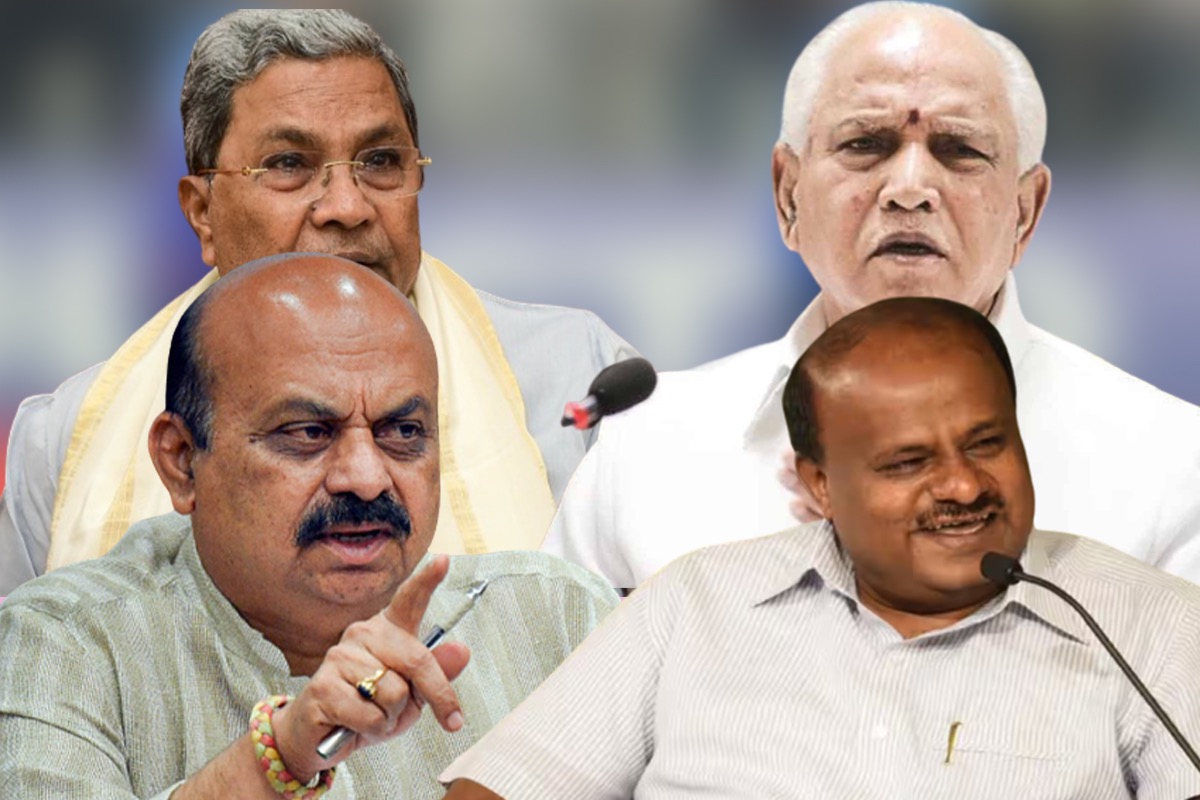Karnataka, the BJP’s sole bastion in South of India is all set to go to polls before May, this year. The state which is the party’s gateway to the rest of southern states will be crucial for BJP to retain. However, traditionally, the electorate of Karnataka refrains from electing the same government two times in a row.
In 2018, the Janata Dal (Secular) and Indian National Congress formed a coalition government, with BJP sitting out of power despite being the party with the highest seat count. JDS had won 37 seats, Congress 78 and BJP 104. Due to internal conflicts in power sharing, H. D. Kumaraswamy’s government came crashing down within a year.
In 2020, Bharatiya Janata Party (BJP) formed the state government, with B. S. Yediyurappa becoming Chief Minister.
In July 2021, Yediyurappa resigned from Chief Minister’s post and Basavaraj Bommai was sworn in as the new Chief Minister of Karnataka.
Karnataka has shown two long term political trends for the last four decades. It has never elected the same party consecutively in Assembly Elections, and it has never given a majority to the same party in consecutive assembly and Lok Sabha elections.
Can BJP beat anti-incumbency and ride on Prime Minister Narendra Modi’s image to retain the state?
One of the most politically significant legislative decisions of the Bommai government was the passage of the anti-Conversion law that prohibits forcible conversions to other religions. This is sure to yield rich electoral dividends for the BJP. There was a latent demand for the law from seers of influential communities.
In December 2021, the BJP government under Chief Minister Bommai, passed the Anti-Conversion bill (The Karnataka Right to Freedom of Religion Bill). The bill prohibits forcible conversion of religion from one to another, by fraud, allurement, or marriage. The bill provides exemptions if one needed to re-convert back to his/her immediate previous religion.
Bommai’s state budget was directed at the upcoming elections with focus on infrastructure.
Karnataka was the hub of some of the most controversial decisions that impinge on larger questions like the secular framework of the constitution and the long long pending Uniform Civil Code. Not only did the passage of anti-conversion law saw clashes with Christian groups, Karnataka was also at the centre of the Hijab controversy.
In February 2022, a controversy over hijabs in educational institutions started in Udupi, followed by various protests in the state.
Bommai’s Government issued an order stating that the uniforms mandated by the state government, the school management, or college development committees must be worn compulsorily. On 15 March, the High Court of Karnataka upheld the government’s decision not to allow hijabs in educational institutions.
Such a decision would certainly polarise votes.
The Bharatiya Janata Party is hoping to reach out communities beyond its traditional votebank.
Earlier this year, Prime Minister Modi was invited to distribute title deeds to over 50,000 members of the Lambani (Banjara) community, which forms a significant chunk of voters in several districts of northern Karnataka. During his visit, he also inaugurated projects worth Rs 10,800 crore.
In October last year, the Bommai government also increased reservations for Scheduled Castes (SCs) and Scheduled Tribes (STs) in the state by 2 percent and 4 percent, respectively. The Lambanis are classified as SC.
According to the 2011 Census, the SC and ST communities account for around 23 percent of the Karnataka population.
Keen to secure a majority on its own this time, the BJP has been reaching out to communities beyond its traditional support base.
BJP is trying to make inroads into the Mandya region, which is dominated by the Vokkaliga community, largely seen as a bastion of Janata Dal (Secular), where the Congress too is strong.
Mandya falls in Old Mysuru region, and has 89 seats (including 28 in Bengaluru). The region is spread across 11 districts in south Karnataka including Mysuru, Mandya, Chamarajnagar, Hassan and Kolar, and it is here that the BJP is now sharply focusing on.
Finally, the biggest challenge is the BJP faces is the allegations of corruption in the state. The president of State Contractors Association, D Kempanna, accused the Bommai government of collecting 40 per cent commission in government contracts.
He publicly stated in mid-2021 that the situation is unbearable for the contractors and this should be investigated. BJP was accused of corruption and was given a label of ‘40% Commission Sarkar’ by the opposition and the critics.
PSI (Police Sub Inspector) Scam is another corruption case that the party has faced in recent years. This pertains to the Karnataka Police recruitment cell conducting an examination last year for filling up 545 vacancies of sub- inspectors in the state police department.
Out of 545 candidates selected from over 54,000 applicants, a total of 52 candidates were arrested with 19 candidates found to have cheated by using Bluetooth devices and 33 others by the tampering of their answer scripts by the officials of the police recruitment cell or staff at the examination centres.
Additional Director General of Police Amrit Paul, who headed the police recruitment cell when the scam took place, was arrested by the CID last year. As many as 12 policemen were also arrested by the CID.
Karnataka being a major southern Indian state with 28 Lok Sabha seats, holds significance. BJP coming back to power in Karnataka will send a strong signal for Prime Minister Modi’s model of governance that has the capacity to beat anti-incumbency as we have seen in recent Gujarat, Uttarakhand and UP polls.










